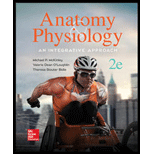
Anatomy & Physiology: An Integrative Approach
2nd Edition
ISBN: 9780078024283
Author: Michael McKinley Dr., Valerie O'Loughlin, Theresa Bidle
Publisher: McGraw-Hill Education
expand_more
expand_more
format_list_bulleted
Concept explainers
Question
Chapter 13.3, Problem 13WDYL
Summary Introduction
To enlist:
The five cerebral lobes and the functions of each of the lobe.
Concept introduction:
The cerebrum is composed of two halves each half of the cerebrum is known as a right hemisphere and left hemisphere. Both the hemispheres are divided into smaller lobes, which are the functional areas of the brain. The cerebrum regulates the motor control and the cognitive functions.
Expert Solution & Answer
Want to see the full answer?
Check out a sample textbook solution
Students have asked these similar questions
List the five cerebral lobes and the main functions of each.
Locate the sensory, association, and motor areas of the cerebral cortex, and describe the general functions of each.
List the major lobes, fissures, and functional areas of the cerebral cortex.
Chapter 13 Solutions
Anatomy & Physiology: An Integrative Approach
Ch. 13.1 - Prob. 1WDYLCh. 13.1 - How does the neural plate form a neural tube?Ch. 13.1 - Identify the five secondary vesicles, and list the...Ch. 13.1 - Prob. 4WDYLCh. 13.2 - From deepest (closest to the brain) to superficial...Ch. 13.2 - Prob. 6WDYLCh. 13.2 - Prob. 7WDYLCh. 13.2 - Prob. 8WDYLCh. 13.2 - Prob. 9WDYLCh. 13.2 - How does the blood-brain barrier protect nervous...
Ch. 13.3 - Prob. 11WDYLCh. 13.3 - What is the function of the corpus callosum?Ch. 13.3 - Prob. 13WDYLCh. 13.3 - Prob. 14WDYLCh. 13.3 - Prob. 15WDYLCh. 13.3 - Prob. 16WDYLCh. 13.3 - Prob. 17WDYLCh. 13.3 - Prob. 18WDYLCh. 13.3 - Prob. 19WDYLCh. 13.3 - Prob. 20WDYLCh. 13.4 - Prob. 21WDYLCh. 13.4 - What is the general function of the thalamus?Ch. 13.4 - Prob. 23WDYLCh. 13.5 - What is the function of the substantia nigra, and...Ch. 13.5 - Prob. 25WDYLCh. 13.5 - Prob. 26WDYLCh. 13.5 - Prob. 27WDYLCh. 13.5 - What are the three main autonomic centers located...Ch. 13.6 - Prob. 29WDYLCh. 13.6 - Prob. 30WDYLCh. 13.6 - Prob. 31WDYLCh. 13.7 - Prob. 32WDYLCh. 13.7 - Prob. 33WDYLCh. 13.7 - How is the reticular activating system related to...Ch. 13.8 - Prob. 35WDYLCh. 13.8 - Prob. 36WDYLCh. 13.8 - What are the main differences between non-REM and...Ch. 13.8 - Prob. 38WDYLCh. 13.8 - Prob. 39WDYLCh. 13.8 - Prob. 40WDYLCh. 13.8 - How is the Wernicke area involved in language...Ch. 13.8 - Prob. 42WDYLCh. 13 - _____ 1. Which cranial nerve is responsible for...Ch. 13 - Prob. 2DYKBCh. 13 - _____ 3. Which of these is the least likely to...Ch. 13 - Prob. 4DYKBCh. 13 - _____ 5. Which of the following statements is...Ch. 13 - Prob. 6DYKBCh. 13 - Prob. 7DYKBCh. 13 - Prob. 8DYKBCh. 13 - Prob. 9DYKBCh. 13 - Prob. 10DYKBCh. 13 - Prob. 11DYKBCh. 13 - Prob. 12DYKBCh. 13 - Prob. 13DYKBCh. 13 - Prob. 14DYKBCh. 13 - Prob. 15DYKBCh. 13 - Describe the pathway by which the pressure applied...Ch. 13 - Prob. 17DYKBCh. 13 - During surgery to remove a tumor from the...Ch. 13 - What is the difference between apraxia of speech...Ch. 13 - Prob. 20DYKBCh. 13 - Prob. 1CALCh. 13 - Prob. 2CALCh. 13 - Prob. 3CALCh. 13 - Why did Shannon experience the problems with her...Ch. 13 - Prob. 5CALCh. 13 - Peyton felt strange when she awoke one morning....Ch. 13 - Prob. 2CSLCh. 13 - During a robbery at his convenience store, Dustin...
Knowledge Booster
Learn more about
Need a deep-dive on the concept behind this application? Look no further. Learn more about this topic, biology and related others by exploring similar questions and additional content below.Similar questions
- Describe and identify the five lobes of the cerebral cortex, and explain how motor and sensory functions are distributed among the lobes.arrow_forwardIdentify the three major regions of the brain stem, and note the functions of each area.arrow_forwarddescribe the distinctive cell types and histologicalarrangement of the cerebral cortex; andarrow_forward
- Identify the major regions of the brain and provide themain functions of each region.arrow_forwardDescribe the locations and functions of the sensory, association,and motor areas of the cerebral cortex.arrow_forwardWhat functional activities are associated with the left and the right hemispheres of the cerebral cortex?arrow_forward
arrow_back_ios
SEE MORE QUESTIONS
arrow_forward_ios
Recommended textbooks for you
 Human Physiology: From Cells to Systems (MindTap ...BiologyISBN:9781285866932Author:Lauralee SherwoodPublisher:Cengage Learning
Human Physiology: From Cells to Systems (MindTap ...BiologyISBN:9781285866932Author:Lauralee SherwoodPublisher:Cengage Learning

Human Physiology: From Cells to Systems (MindTap ...
Biology
ISBN:9781285866932
Author:Lauralee Sherwood
Publisher:Cengage Learning